初中英语动词时态复习讲义全
中考英语动词时态讲解 PPT资料共46页.ppt

动词的时态
一、基本知识复习: (一)动词的时态
时态是时间所影响的谓语动词的动作或 情况的谓语形式。河南中考要求初中生 掌握的五种时态:一般现在时、一般过 去时、一般将1)表示经常性、习惯性或有某种规律的动 作,常与always, often, usually,
[解题技巧] 以此立意的试题考查考生能否通过一些表 示过去某时间点的时间状语“at this time of, when+从句”判断出延续动词用过去 进行时态。 本题中的时间状语是一个表示过去的时间 点,表示过去的时间点与延续动词连用时, 延续动词用过去进行时态,选B。
9.上下文所决定的过去进行时态
[解题技巧] 以此立意的试题考查考生能否通过上下 文语境判断出动词用现在进行时态。 本题中,句子的语境暗示出了现在的进 行动作,用现在进行时态,选C。
3. 一些频度副词决定的一般现在时态
Every year many foreigners_________
to China to learn Chinese.
[解题技巧] 以此立意的试题考查考生是否能通过一些 表示过去的时间状语yesterday, two weeks ago, last Sunday, in 2019,just now等判断出 动词用一般过去时态。 本题中的half an hour ago是一个表示过去 的时间状语,谓语动词用一般过去时态, 选B。
2)对以前某段时间before, in the past few years, so far, since 2 years ago, for 2 years所经历过的事情的一个小结:
A. 有没有过某经历:用ever, never提示。 Have you ever watched English movies? 你看过英文电影吗?
初中英语动词时态总复习(超级精华版) (2).ppt

例如:He said that he would finish his work before 9 o’clock.
他说他会在九点之前完成工作。
2)“was/were going to+动词原形”所表示的过去将来
时,表示过去曾经打算或将要做某事。
Jim doesn't do his homework every day.
二、一般过去时
1.一般过去时的结构: 主语+动词过去式+其它 I did my homework yesterday. (did就是do的过去式)
动词原形变为动词过去式的规则:
构成规则
一般在动词原形末尾加 -ed在清辅音后读∕t∕;在 浊辅音和元音后读∕d∕;
初中英语动词时态复习
一、一般现在时 二、一般过去时
三、一般将来一时般现在四时、过去将来时 五、现在进行一时般现在六时、过去进行时 七、现在完成时 八、过去完成时
一、一般现在时
1.一般现在时的结构: 主语+动词原形+其它 I do my homework every day. 主语+am/is/are+其它 I am a student.
例如:The train leaves at six tomorrow morning.
火车明天上午六点开。
6)在复合句中,当主句是一般将来时,时间状语 从句或条件状语从句的谓语动词只能用一般现在 时来表示将来。
例如: I'll tell him the news when he comes back. 他 回来时,我将告诉他这个消息。
中考英语动词时态讲解 PPT资料共46页.ppt

[解题技巧] 以此立意的试题考查考生能否通过“过去 动作对现在的影响”这一含义判断出动词 用现在完成时态。
本题中“从去年至今我都没有见过我的老 师了”,对现在的影响是“我想念老师”, 强调了“没有看”这一动作对现在的影响, 选C。
11. “经历”所采用的现在完成时态。
—Would you like to see the film with me?
4.现在进行时的用法
1) 现在进行时表示说话时或近阶段正在进 行的动作,由“be十现在分词”构 成.例如: Look! The students are reading. (说话 时正在进行的动作)
We’re all working for the 2019 Olympics.(近阶段正在进行的动作)
he _______.
A. returned C. will return
B. returns (成都)
[解题技巧] 以此立意的试题考查考生是否掌握了when, until, as soon as等引导的时间状语从句和if 引导的条件状语从句中的一般现在时态。
本题中的主句是一个一般将来时态,as soon as引导的从句用一般现在时态与之呼 应,选B。
My friend will come tomorrow. Mr Green will teach us English next term. 注:Will you do…? 还可表示一种请求的 语气。
如: I can’t carry the box, will you help me? 2) “ to be going to十动词原形”,表示即将
David had a good time yesterday. I usually got up early when I was young. 2)表示过去经常发生的动作,也可用 “used to+do”表示。例如: My father used to smoke. Grandma used to be a history teacher 注意;used to表示过去常发生而现在不 再发生的动作或存在的状态。
初中英语知识归纳总结——动词的时态

初中英语知识归纳总结——动词的时态动词的时态(一)教学重点一般现在时在英语中,不同时间里以不同方式发生的动作或存在的状态,要用不同的动词形式来表示,动词的这种不同形式称为动词的时态。
时态从时间上划分,可分为四大类:现在时;过去时;将来时;过去将来时。
从行为上,每一类可以分为四种形式:一般式;进行式;完成式;完成进行式。
这样英语的动词合起来,总共有十六种时态,初中只需掌握其中的八种时态。
1、一般现在时(1)一般现在时表示现在的状态、习惯性的动作或主语所具备的性格和能力等。
①当动词是be时,第一人称用am,第二人称用is,其他人称用are.②当动词是实义动词时,一般用动词原形,但如果主语是第三人称单数时,动词必须用第三人称单数形式,其变化规则如下:助动词do(第三人称单数用does)构成否定句、疑问句及答语,但要注意助动词后原来的谓语动词要恢复原形。
例如:I like music.I don’t like music.Do you like music?Yes, I do No, I don’t(2)一般现在时的用法①表示经常、习惯性动作,常和often, usually, every day, sometimes, always 等时间状语连用。
如:He goes to school by bus every day.They often play football②表示能力、职业、特征。
如:Miss Gao teaches English.Do you speak Japanese?③表示客观存在。
如:The earth moves round the sun.Time and tide wait for no man.④表示已经安排好或计划好的事。
如The plane takes off at 7:30.Classes begin at 8:00⑤在时间状语和条件状语从句中,主句用一般将来时,从句用一般现在时。
初中英语时态讲解及练习(全)

时间状语:Tomorrow, next day(week, month, year…),soon, in a few minutes, by…,the day after tomorrow, etc.
否定形式:主语+am/is/are not going to do ; 主语+will/shall not do+其他 一般疑问句:be放于句首;will/shall提到句首。
1.I ____(write, am writing, is writing, are writing) a letter now. 2.Look, it _____(begin, is beginning, am beginning, are beginning) to rain. 3.They ____(study, is studying, am studying, are studying) medicine at the Medical Institute of Chengde these days. 4.He _____(teach, am teaching, is teaching, are teaching) an English lesson at this time.
谓语动词使用过去式形式, 加ed,分为规则和不规则变 化。表示过去经常发生的动 作,也可用“used to do ” 和“would +动词原形”。
1. He____(be, was, were, been) here a moment ago. 2. They ____(be, was, were, been) here just now. 3. The scientists _____(leave, leaves, leaved, left) for America yesterday. 4. Last week we ______(visit, visited ) the Science Museum. 5. When I was a child, I often ____(play, played) football. 6. The students ran out of the classroom as soon as the bell ____(ring, rang, rung).
2023年中考英语专题精品课件--动词的时态课件

A. discuss
B. discussed
C. will discuss
12. Volunteers __C___ books and toys to some village schools next Monday.
A. send
B. sent
C. will send
13. —Bob, have you finished reading the book? 时态看问句
一般现在时表示将来 表示按规定或时间表预计将发生的动作 主将从现,用在以if、as soon as、until、when oon; next week/month...(next系列); in a week、in 2024、in+一段时间; one day、in the (near) future等
一般过去时与过去进行时
过去进行时--构成 主语+was/were +动词现在分词+其他 过去进行时--用法 表示过去某一时刻正在进行或发生的动作 表示过去某一时间段内正在进行或发生的动作 在含有时间状语从句的复合句中,延续时间较长的动作用过去进行时, 另一个短暂性动作用一般过去时 表示两个延续性动作在过去某一时刻同时进行时,不考虑动作的先后顺 序,主句和从句的谓语动词都用过去进行时,连词常用while
A. am talking
B. was talking
C. were talking
4. —Is this your camera?
—Yes, I ___C_____ it for two weeks. 现在完成时
A. bought
B. had
C. have had
5. As soon as she ___A__ in Nanning, she will call you.
译林版完整版初中英语动词时态讲义全
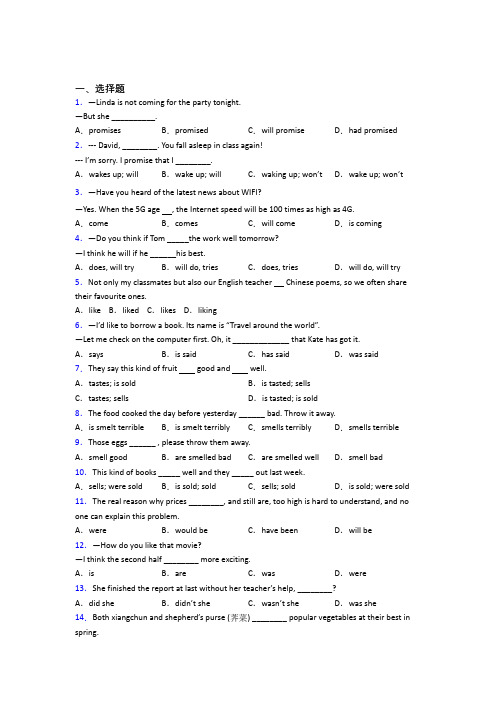
一、选择题1.—Linda is not coming for the party tonight.—But she __________.A.promises B.promised C.will promise D.had promised 2.--- David, ________. You fall asleep in class again!--- I’m sorry. I promise that I ________.A.wakes up; will B.wake up; will C.waking up; won’t D.wake up; won’t 3.—Have you heard of the latest news about WIFI?—Yes. When the 5G age , the Internet speed will be 100 times as high as 4G.A.come B.comes C.will come D.is coming 4.—Do you think if Tom _____the work well tomorrow?—I think he will if he ______his best.A.does, will try B.will do, tries C.does, tries D.will do, will try 5.Not only my classmates but also our English teacher Chinese poems, so we often share their favourite ones.A.like B.liked C.likes D.liking6.—I’d like to borrow a book. Its name is “Travel around the world”.—Let me check on the computer first. Oh, it _____________ that Kate has got it.A.says B.is said C.has said D.was said 7.They say this kind of fruit good and well.A.tastes; is sold B.is tasted; sellsC.tastes; sells D.is tasted; is sold8.The food cooked the day before yesterday ______ bad. Throw it away.A.is smelt terrible B.is smelt terribly C.smells terribly D.smells terrible 9.Those eggs ______ , please throw them away.A.smell good B.are smelled bad C.are smelled well D.smell bad 10.This kind of books _____ well and they _____ out last week.A.sells; were sold B.is sold; sold C.sells; sold D.is sold; were sold 11.The real reason why prices ________, and still are, too high is hard to understand, and no one can explain this problem.A.were B.would be C.have been D.will be 12.—How do you like that movie?—I think the second half ________ more exciting.A.is B.are C.was D.were13.She finished the report at las t without her teacher’s help, ________?A.did she B.didn’t she C.wasn’t she D.was she 14.Both xiangchun and shepherd’s purse (荠菜) ________ popular vegetables at their best in spring.A.are B.is C.will be D.were 15.—Mark’s car ________ a cloud of dust as h e drove off.—That’s why we dislike him at all.A.raised B.rose C.was raised D.was rising 16.—Stop, please! Look at the sign “No photos”over there. — Oh, sorry. I ________ it. A.didn’t notice B.haven’t noticed C.won’t notice D.didn’t do 17.— Why didn't you answer my call?— sorry. I _______ an old friend and we _______all the time.A.have met; are talking B.met; talked C.met; are talkingD.met; were talking18.Candy has decided to move to Taipei next year. When she studies in an art school there, she ________ with her aunt for five months.A.lives B.lived C.has lived D.will live 19.—The moon ________ its first female astronaut by the year 2024.—Wow, this will truly be a remarkable moment in history.A.has welcomed B.is welcomed C.welcomed D.will welcome 20.It’s reported that NASA ________ a woman to the Moon in 2024!A.sent B.send C.is sending D.will send 21.— There ______ a student science fair in our school next week.— How cool !A.was B.is C.are going to be D.is going to be 22.— What a pity that Kobe Bryant has died in a terrible accident!— Yes. But the work he has done ________ encouraging us.A.will keep B.would keep C.has kept D.had kept 23.—When ________ you ________ reading the book Little Women?—It's hard to say. I'm busy these days and have no time to continue reading.A.did; finish B.have; finished C.will; finish D.do; finish 24.—Is there anything wrong with your mobile phone?— Yes, I hope you _________.A.to repair B.to have it repaired C.have repaired it D.will have it repaired 25.—Look at the sign. It says “No photos”. We shouldn’t take photos here.—Sorry. I ________ the sign.A.didn’t notice B.don’t notice C.wasn’t noticing D.haven’t noticed 26.He’s been informed that he ________ for the scholarship because of his academic background.A.hasn’t qualified B.hadn’t qualifiedC.doesn’t qualify D.wasn’t qualifying27.As they’re handmade, each one __________ slightly in shape.A.various B.varied C.varies D.variety28.This sort of clothing material, which feels soft, ______.A.catches fire easily B.is caught fire easilyC.is easy caught fire D.is easily to catch fire29.This kind of cloth_______well and large quantities of the cloth ________.A.is sold; have been sold B.is sold; has been soldC.sells; have been sold D.sells ; has been sold30.—Why are you so upset?—I had my computer repaired yesterday, but it ________ work again.A.doesn’t B.didn’tC.won’t D.wouldn’t31.The school in library my mother works in the east of the village.A.whose;lies B.which;lay C.which;lies D.which;lying 32.We’ll go to play with snow if it ______ tomorrow.A.snow B.snowsC.will snow D.snowed33.The palace caught fire three times in the last century, and little of the original building________ now.A.is remained B.is remainingC.remains D.has been remained34.Walmart, which is one of the largest American supermarket chains, some of its stores open 24 hours on Mondays through Saturdays.A.keeps B.keepC.have kept D.had kept35.Professor Williams keeps telling his students that the future ___ to the well-educated. A.belongs B.is belongedC.is belonging D.will be belonged36.---Alan seems a lot taller than when I last saw him.---He . He’s grown a foot since you saw him in Shanghai.A.is B.will beC.has been D.was37.Wars are disasters. A large number of people will lose their homes if a war . A.breaks out B.is broken out C.will break out D.will be broken out 38.Experience is a hard teacher because she ________ the test first, the lesson afterwards. A.gives B.has given C.was giving D.would give39.The drama, “The Empress of China" that was pulled off the air for technical reasons now back on TV.A.is B.are C.has D.have40.Many a woman______ important positions in society, which________impossible in the past.A.holds; was B.hold ; were C.held; was D.holding; were41.Honesty ___________ an important role in a child’s ability to succeed in school and later life. A.played B.playsC.had played D.has played42.Frank ________ stamps in his spare time. It’s his hobby.A.is collecting B.collectsC.collected D.was collecting43.Every time he ______ to visit me, he ______ buy me some books.A.will come; will B.will come; wouldC.comes; will D.comes; would44.That’s why I help brighten people’s days. If you ________, who’s to say that another person will?A.didn’t B.don’tC.weren’t D.haven’t45.---We’d better leave now.---No hurry. The train ______ at 10 o’clock.A.has left B.leftC.leaves D.would leave46.Wishing you the best of luck. We ________ your telephone number and will call you if anything comes up.A.have B.will have C.had D.would have 47.As the town ______ good restaurants, we just treated the foreign friends to some local food at home yesterday.A.didn’t have B.doesn’t haveC.won’t have D.hadn’t had48.My parents in Hong Kong. They were born there and have never lived anywhere else.A.live B.livedC.were living D.will live49.“81192”, the number of Wang Wei’s plane, ________ up on many Chinese media outlets to remind us of our hero on April 1 every year.A.showed B.showing C.to show D.shows50.I must say he reads very well, and I shouldn’t be surprised if he ______ acting for a living one day.A.had taken up B.would have taken up C.have taken up D.takes up【参考答案】***试卷处理标记,请不要删除一、选择题1.B【详解】句意:——琳达今晚不来参加聚会了。
(完整版)初中英语动词时态和语态讲解
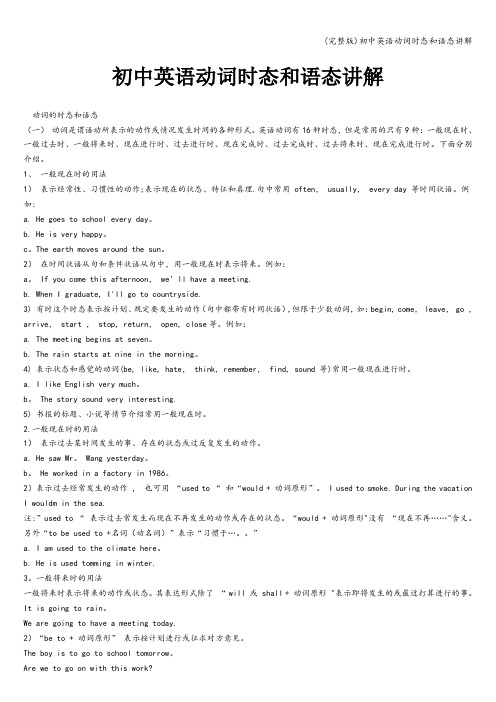
初中英语动词时态和语态讲解动词的时态和语态(一)动词是谓语动所表示的动作或情况发生时间的各种形式。
英语动词有16种时态,但是常用的只有9种:一般现在时、一般过去时、一般将来时、现在进行时、过去进行时、现在完成时、过去完成时、过去将来时、现在完成进行时。
下面分别介绍。
1、一般现在时的用法1)表示经常性、习惯性的动作;表示现在的状态、特征和真理.句中常用 often, usually, every day 等时间状语。
例如:a. He goes to school every day。
b. He is very happy。
c。
The earth moves around the sun。
2)在时间状语从句和条件状语从句中,用一般现在时表示将来。
例如:a。
If you come this afternoon,we’ll have a meeting.b. When I graduate, I'll go to countryside.3) 有时这个时态表示按计划、规定要发生的动作(句中都带有时间状语),但限于少数动词,如:begin, come, leave, go ,arrive, start , stop, return, open, close等。
例如:a. The meeting begins at seven。
b. The rain starts at nine in the morning。
4) 表示状态和感觉的动词(be, like, hate, think, remember, find, sound 等)常用一般现在进行时。
a. I like English very much。
b。
The story sound very interesting.5) 书报的标题、小说等情节介绍常用一般现在时。
2.一般现在时的用法1)表示过去某时间发生的事、存在的状态或过反复发生的动作。
初中英语动词时态复习讲义

初中英语动词时态复习讲义一.一般现在时一、动词的第三人称词尾变化:1. 一般现在时的用法1)表示经常的或习惯性的动作,常与表示频度的副词连用。
常用的频度副词有:always、often、usually、seldom、never。
频度副词在句中通常放在行为动词之前,系动词、助动词之后。
例如: He often goes swimming in summer.他夏天经常游泳。
I usually leave home for school at 7 every morning. 每天早上我七点离开家。
2)表示现在的状态。
例如:My father is at work.He is very busy. 我父亲在工作,他很忙。
The boy is twelve. 这男孩十二岁。
3)表示主语具备的性格、特征和能力等。
例如:All my family love football .我全家人都喜欢足球。
My sister is always ready to help others . 我妹妹总是乐于助人。
Ann writes good English but does not speak well. 安英语写得不错,讲的可不行。
4)表示客观真理,客观存在,自然现象。
例如:The earth moves around the sun. 地球绕太阳转动。
Shanghai lies in the east of China. 上海位于中国东部。
5)表示按计划或安排好的,或将要发生的动作,可用一般现在时表将来。
但只限于start,begin,leave,go,come,arrive,return,take place等。
例如:The train leaves at six tomorrow morning. 火车明天上午六点开。
He comes back tonight. 他今晚回来。
6)在复合句中,当主句是一般将来时,时间或条件状语从句的谓语动词只能用一般现在时来表示将来要发生的动作。
(详细版)初中英语动词时态和语态讲解
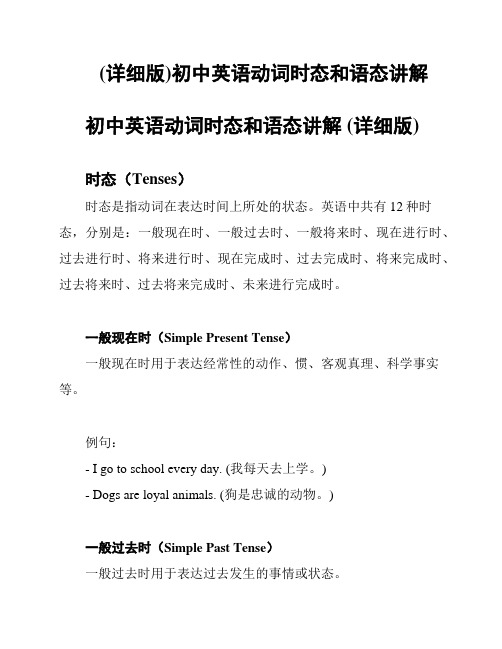
(详细版)初中英语动词时态和语态讲解初中英语动词时态和语态讲解 (详细版)时态(Tenses)时态是指动词在表达时间上所处的状态。
英语中共有12种时态,分别是:一般现在时、一般过去时、一般将来时、现在进行时、过去进行时、将来进行时、现在完成时、过去完成时、将来完成时、过去将来时、过去将来完成时、未来进行完成时。
一般现在时(Simple Present Tense)一般现在时用于表达经常性的动作、惯、客观真理、科学事实等。
例句:- I go to school every day. (我每天去上学。
)- Dogs are loyal animals. (狗是忠诚的动物。
)一般过去时(Simple Past Tense)一般过去时用于表达过去发生的事情或状态。
例句:- We visited Paris last summer. (去年夏天我们参观了巴黎。
)- She lived in Japan for two years. (她在日本住了两年。
)一般将来时(Simple Future Tense)一般将来时用于表达将来将要发生的事情或状态。
例句:- I will call you tomorrow. (我明天会打电话给你。
)- They are going to travel to Europe next month. (他们下个月要去欧洲旅行。
)现在进行时(Present Continuous Tense)现在进行时用于表达正在进行的动作。
例句:- She is studying for her exams. (她正在为考试而研究。
)- They are playing soccer in the park. (他们正在公园里踢足球。
)过去进行时(Past Continuous Tense)过去进行时用于表达过去某个时间正在进行的动作。
例句:- We were watching a movie when the power went out. (停电时我们正在看电影。
初中英语语法动词八种时态详解
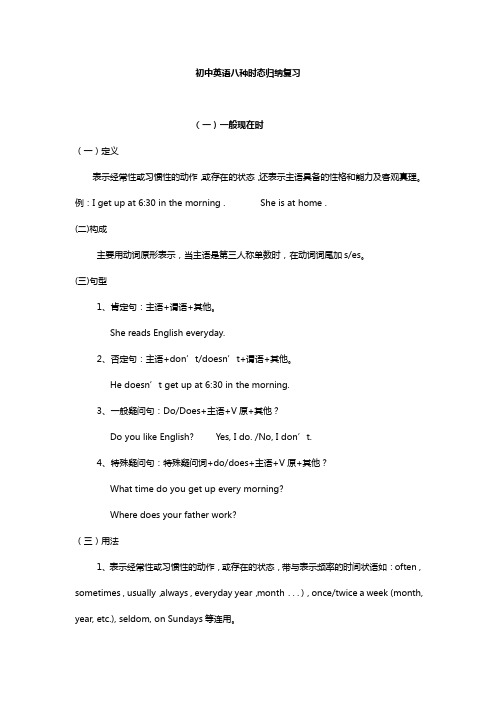
初中英语八种时态归纳复习(一)一般现在时(一)定义表示经常性或习惯性的动作,或存在的状态,还表示主语具备的性格和能力及客观真理。
例:I get up at 6:30 in the morning . She is at home .(二)构成主要用动词原形表示,当主语是第三人称单数时,在动词词尾加s/es。
(三)句型1、肯定句:主语+谓语+其他。
She reads English everyday.2、否定句:主语+don’t/doesn’t+谓语+其他。
He doesn’t get up at 6:30 in the morning.3、一般疑问句:Do/Does+主语+V原+其他?Do you like English? Yes, I do. /No, I don’t.4、特殊疑问句:特殊疑问词+do/does+主语+V原+其他?What time do you get up every morning?Where does your father work?(三)用法1、表示经常性或习惯性的动作,或存在的状态,带与表示频率的时间状语如:often , sometimes , usually,always , everyday year,month...), once/twice a week (month, year, etc.), seldom, on Sundays等连用。
I leave home for school at seven every morning.2、表示客观真理,科学事实、格言警句。
The sun rises in the east .日出东方。
The earth goes around the sun .地球绕着太阳转。
Ten minus two is eight.十减二等于八。
Light travels faster than sound .光的速度比声音的速度快。
中考英语语法动词的时态复习讲义及总结与整理
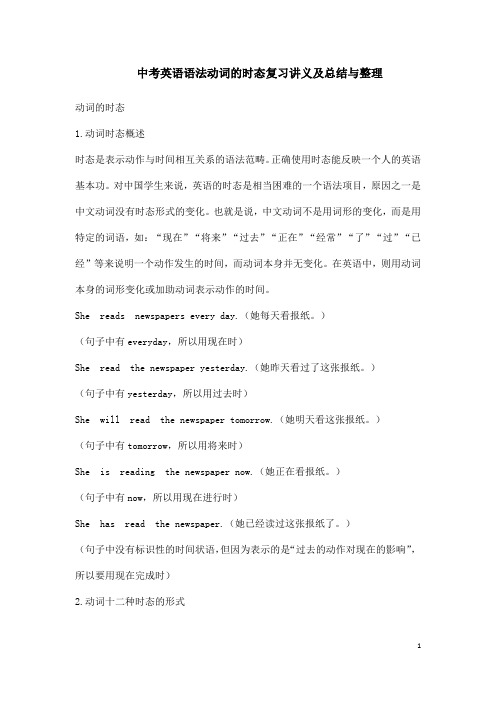
中考英语语法动词的时态复习讲义及总结与整理动词的时态1.动词时态概述时态是表示动作与时间相互关系的语法范畴。
正确使用时态能反映一个人的英语基本功。
对中国学生来说,英语的时态是相当困难的一个语法项目,原因之一是中文动词没有时态形式的变化。
也就是说,中文动词不是用词形的变化,而是用特定的词语,如:“现在”“将来”“过去”“正在”“经常”“了”“过”“已经”等来说明一个动作发生的时间,而动词本身并无变化。
在英语中,则用动词本身的词形变化或加助动词表示动作的时间。
She reads newspapers every day.(她每天看报纸。
)(句子中有everyday,所以用现在时)She read the newspaper yesterday.(她昨天看过了这张报纸。
)(句子中有yesterday,所以用过去时)She will read the newspaper tomorrow.(她明天看这张报纸。
)(句子中有tomorrow,所以用将来时)She is reading the newspaper now.(她正在看报纸。
)(句子中有now,所以用现在进行时)She has read the newspaper.(她已经读过这张报纸了。
)(句子中没有标识性的时间状语,但因为表示的是“过去的动作对现在的影响”,所以要用现在完成时)2.动词十二种时态的形式英语动词共有十六种时态,一般语法书列出的英语动词的十二种时态为“现在”“过去”和“将来”三大类;每类中又分为“一般”“进行”“完成”“完成进行”四种,共十二种,下面以study为例,列表说明。
注意:初中阶段最常用的时态有5种,即一般现在时、一般过去时、现在进行时、一般将来时和现在完成时。
在下面的文章中,将分别讲述各种时态的具体用法。
不规则动词变化表例题:( )1. —When did you meet him? —While I ____ on the street.A. walksB. walkC. was walkingD. am walking( )2. —Mum, why don't you go to sleep? —Your sister ____ yet. I ____ for her.A. hasn't come back; am waitingB. didn't come back; was waitingC. hadn't come back; was waitingD. came back; waited( )3. —King White ___ in our company for 20 years.—Yes, and she ___ here when she was 21 years old.A. has worked; has comeB. worked; comesC. worked; cameD. has worked; came( )4. —Don't forget to visit me when you come here.—OK. I ___ you a call as soon as I ____ there.A. gave; getB. will give; will getC. give; will getD. will give; get( )5. —What did you do last summer vacation?—Don't mention it. I ____ always ____ my parents on the farm.A. was; helpingB. / ; helpedC. would; helpD. have; helped( )6. —Would you like to see the movie? —No, thanks.I ____ it twice.A. have seenB. seenC. sawD. had seen( )7. —Are you still single? —No, I ____ for two months.A. have been marriedB. have marriedC. was marryingD. married( )8. —We will do some cleaning if the weather ___ fine tomorrow.—But I think it ____ rain.A. will be; is going toB. is; is going toC. is; hasD. will be; has( )9. —Mike is preparing his luggage. —Yes. He _____ for Canada on vacation.A. leavesB. leftC. is leavingD. has been away( )10. —Be quiet. Dad ___ in the next room. —Sorry.A. sleepsB. sleptC. is sleepingD. was sleeping参考答案:1-5 CADDA 6-10 AABCC。
- 1、下载文档前请自行甄别文档内容的完整性,平台不提供额外的编辑、内容补充、找答案等附加服务。
- 2、"仅部分预览"的文档,不可在线预览部分如存在完整性等问题,可反馈申请退款(可完整预览的文档不适用该条件!)。
- 3、如文档侵犯您的权益,请联系客服反馈,我们会尽快为您处理(人工客服工作时间:9:00-18:30)。
初中英语动词时态复习讲义一般现在时一、动词的第三人称词尾变化:写出下列动词的单数第三人称形式。
1. cook _______2.watch________3.build_________4.have________5.wash________6. enjoy ______7. go _________8 receive ______9 cry______10. close ________ 11. drive _______ 12. choose ______13. play ________14. reach ________二. 一般现在时的用法1)表示经常的或习惯性的动作,常与表示频度的副词连用。
常用的频度副词有:always、often、 usually、seldom、never。
频度副词在句常放在行为动词之前,系动词、助动词之后。
例如: He often goes swimming in summer.他夏天经常游泳。
I usually leave home for school at 7 every morning. 每天早上我七点离开家。
2)表示现在的状态。
例如:My father is at work.He is very busy. 我父亲在工作,他很忙。
The boy is twelve. 这男孩十二岁。
3)表示主语具备的性格、特征和能力等。
例如:All my family love football .我全家人都喜欢足球。
My sister is always ready to help others . 我妹妹总是乐于助人。
Ann writes good English but does not speak well. 安英语写得不错,讲的可不行。
4)表示客观真理,客观存在,自然现象。
例如:The earth moves around the sun. 地球绕太阳转动。
Shanghai lies in the east of China. 位于中国东部。
5)表示按计划或安排好的,或将要发生的动作,可用一般现在时表将来。
但只限于start,begin,leave,go,come,arrive,return,take place等。
例如:The train leaves at six tomorrow morning. 火车明天上午六点开。
He comes back tonight. 他今晚回来。
6)在复合句中,当主句是一般将来时,时间或条件状语从句的谓语动词只能用一般现在时来表示将来要发生的动作。
例如: I'll tell him the news when he comes back. 他回来时,我将告诉他这个消息。
If you take the job , they will talk with you in greater details.如果你接受这份工作,他们将和你谈谈细节。
巩固练习:1、Lucy likes going skating with her friends. (改写成否定句)________________________________________________________2、Aunt Li’s son has ten toy bears. (对划线部分提问)________________________________________________________3、His watch costs 300 yuan. (变成一般疑问句并否定回答)________________________________________________________4、I like being a nurse for the old. (变成一般疑问句)________________________________________________________5、叔叔每天乘坐地铁上班。
________________________________________________________6、我们每周日常花三小时在图书馆看书。
________________________________________________________7、我爷爷常常晚饭后出去散步。
________________________________________________________一般过去时写出下列动词的过去式形式。
1. put ________2. drink _______3. cry _______4. pull ________5. ride ________6.begin ________7. sit ________8. run _________9. take _________ 10.sweep _______11. stop _______ 12. solve _______13. rob ________14. wait _________15.lie _________16. turn _______17. explore _______18. drop _______19. clean ______20. produce _____21.get __________ugh________23.pay________24.die_________25.prefer ______二. 一般过去时的用法1)表示过去某个时间所发生的动作或存在的状态。
常和表示过去的时间状语yesterday, last week, an hour ago,just now, the other day, in 1982等连用。
在一般过去式中,要表达“过多少时间之后”,一般用after。
几年后。
例如:Where did you go just now? 刚才你上哪儿去了?After a few years,she started to play the piano.几年后,她开始弹钢琴。
2)表示在过去,经常或反复发生的动作。
常与often,always等表示频度的副词连用。
例如:When I was a child, I often played football in the street.我是个孩子的时候,常在马路上踢足球。
3)一般过去式也可与today,this week,this month,this year等表现在的时间壮语连用,但这些时间壮语须指过去的时间,决不包含“现在”“此时此刻”的意思。
例如:Did you see him today?今天你看见他了吗?巩固练习:1、Yesterday I went swimming.(改写成否定句。
)________________________________________________________2、He was born in Shanghai.(对划线部分提问)________________________________________________________3我昨天买了一辆新自行车。
________________________________________________________4、我前天读了一本书。
________________________________________________________一般将来时一、一般将来时的构成:助动词will+动词原形在口语中,will在名词或代词后常缩为’ll,wii not常简缩为won’t。
在疑问句中,主语为第一人称时(I和we)时,常用助动词shall。
例如:She’ll go to play basketball. 她要去打篮球。
Shall we go to the zoo? 我们要去动物园吗?二、一般将来时的用法1、表示将来某个时间要发生的动作或存在的状态,常与tomorrow, next year等连用。
例如:I'll meet you at the school gate tomorrow morning.2、表示将来经常或反复发生的动作。
例如:I’ll come and see you every Saturday next year.明年我将每个星期六来看你。
3、表示说话人对于将来的看法、假设和推测,通常用be afraid,be/feel sure,hope,know,think等后面的从句或与副词perhaps,possibly,maybe等连用。
例如:I think she’ll go back home for supper. 我想她会回家吃饭。
Maybe she’ll go to the gym.也许她会去体育馆。
三、be going to +不定式,表示将来。
1、表示主语进行某一行动的打算意图。
这种打算常经过预先考虑并含有自己做好某些准备的意思。
即计划,安排要发生的事。
例如:What are you going to do tomorrow? 明天打算作什么呢?The play is going to be produced next month。
这出戏下月开播。
2、表示说话人确信如此或有某种迹象表明某事即将发生。
例如:Look at the dark clouds, there is going to be a storm. 看那乌云,快要下雨了。
3、注意:be going to 和will之间的区别。
○1两者都用于预测时,be going to意指有迹象表明某件事将要发生,属客观的推测;will则意指说话人认为/相信某件事将要发生,属主观的推测。
○2两者在时间的发生上,be going to通常表示马上要发生或相当快就要发生的事情;而will不指明任何具体时间,可以指遥远的未来。
例如:He is gong in to be better. 他的病就要好起来了。
He will be better. 他的病会好起来了。
○3两者都表示意图时,be going to含有预先计划、准备的意思;will则指未经过预先思考或计划,是临时的一种决定。
○4在条件壮语从句中,be going to表将来,will表意愿。
例如:If you are going to make a journey, you'd better get ready for it as soon as possible.如果你将要去旅行,最好尽快做好准备。
Miss Gao will tell you the answer if you ask her. 如果你去问高老师,她会告诉你答案。
